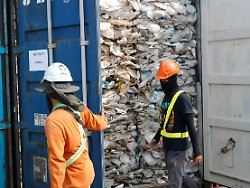Saturday, January 09, 2021
"Ecodumping" instead of recycling
When plastic waste moves around the globe
Dispose of your own garbage as far away as possible abroad? That sounds strange, but it is common in waste management. German plastic waste often ends up in a tropical country where others go on vacation. For environmentalists it is the "fairy tale of the recycling lie".
Plastic waste exports from Germany to other countries have fallen significantly. In 2020, an estimated 986,000 tons of plastic waste were transported across the border, 10 percent less than in the previous year, announced the Federal Association of the German Waste Management, Water and Raw Materials Management (BDE) in Berlin.
That is the good news. The total amounts to almost a sixth of all plastic waste collected in this country. The bad news is: The BDE refers to data from the Federal Statistical Office for the period from January to September, which the association then extrapolated by the end of the year – so overall it is only an estimate. And even if garbage exports are declining, they remain highly controversial.
The price per ton of plastic waste was 20 percent lower last year at EUR 249. The BDE gave no reason for this. According to industry experts, however, there are now strict import barriers in China and other Asian countries that have been in place for a number of years and have slowed down the global waste market somewhat.
In addition, the corona crisis is likely to have an impact – the pandemic did not materialize some business, also because the supply chains were affected.
Malaysia remains the largest customer
The state with the most plastic waste imports from Germany was – as in the previous two years – Malaysia, to which around 150,000 tons were shipped, 32,000 tons less than in 2019.
The Netherlands followed in second place with 142,000 tonnes of plastic waste, the amount remained as high as before. Turkey now appears in third place in the export table; the country in the eastern Mediterranean has roughly doubled its plastic waste imports to 132,000 tons within a year. Exports to Turkey have increased significantly since 2017. Poland, Hong Kong, Austria and Indonesia also play a major role as customers with around 50,000 tons each.
Garbage exports are controversial. On the one hand, plastic waste is a raw material that can also be processed in other countries – for example into clothing made of polyester, street bollards or toilet bowls. From the perspective of representatives of the waste industry, such exports make sense as they are part of a global circular economy and result in less plastic having to be burned in power plants – for them, cross-border waste transports are a normal part of the business.
Greenpeace: "completely uncontrolled"
In fact, according to the BDE statistics, Germany not only exported plastic waste, but also imported it – 479,000 tons in 2020. 262 euros were paid per ton, a decrease of 13 percent compared to the previous year. "In a globalized economy based on the division of labor, which is increasingly to become a circular economy, the extraction of raw materials and the trading of raw materials are also very important," says BDE President Peter Kurth. "This applies to raw materials from nature as well as raw materials from waste treatment."
On the other hand, critics point out risks. Photographs of German packaging waste in nature in Malaysia made negative headlines. Greenpeace criticizes the fact that the whereabouts and actual recycling of a large part of the waste abroad are "completely unclear and uncontrolled". The environmentalists complain that checks on waste exports only "can" be carried out and do not have to, as emerges from a response by the federal government to a Green inquiry.
Greenpeace consumer expert Viola Wohlgemuth says: "In Germany we live the fairy tale of a recycling lie, based on the motto" Out of sight, out of mind! "With exports, Germany is shifting its problems with handling the plastic waste masses to others From their point of view, all plastic waste exports should be banned – this would increase the pressure to recycle the plastic well or to only produce packaging that is recyclable.
Packaging that cannot be recycled and instead is incinerated, such as certain trays for sausage or beverage cartons made from mixed materials, is still used in food retailing.
"Ecodumping" and "recycling lie"
The topic is a hot topic, and waste management is also aware of that. "The sensitivity of society to the cross-border trade in plastic waste is understandable," says BDE President Kurth. "It needs clear framework conditions that are suitable for enforcement, and transparency." The export and import of waste should serve an improved circular economy.
"Waste should be used where it can be best treated and not necessarily where it is generated," says the industry representative in favor of exports. "If the rules on eco-dumping are abused, the cross-border waste shipment must be stopped, otherwise there will be no social acceptance," says Kurth. "Exporting raw materials that land in landfills in other countries is illegal – and must be effectively prevented."
The BDE boss underpins his demand that industry and trade should use more recyclates – i.e. recycled plastic – overall. This would stimulate the market and more plastic than before would be recycled and reused.
. (tagsToTranslate) Economy (t) Plastic waste (t) Malaysia (t) Recycling (t) Greenpeace (t) China
